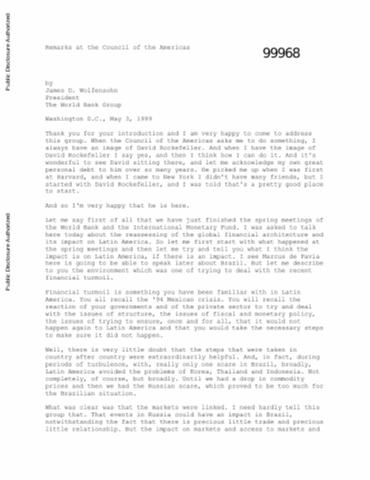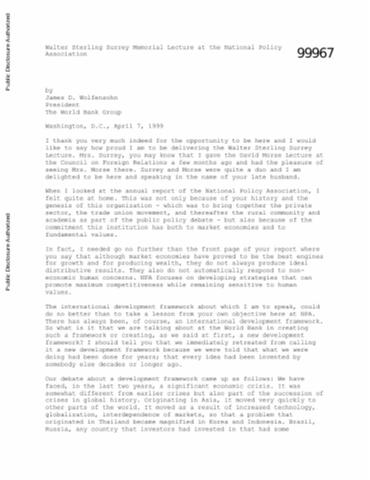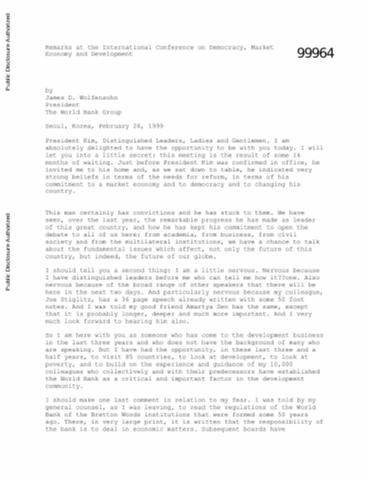The World Bank is a vital source of financial and technical assistance to developing countries around the world. We are not a bank in the ordinary sense but a unique partnership to reduce poverty and support development. The World Bank Group has two ambitious goals: End extreme poverty within a generation and boost shared prosperity.
- To end extreme poverty, the Bank's goal is to decrease the percentage of people living on less than $1.25 a day to no more than 3% by 2030.
- To promote shared prosperity, the goal is to promote income growth of the bottom 40% of the population in each country.
The World Bank Group comprises five institutions managed by their member countries.
The World Bank Group and Land: Working to protect the rights of existing land users and to help secure benefits for smallholder farmers
The World Bank (IBRD and IDA) interacts primarily with governments to increase agricultural productivity, strengthen land tenure policies and improve land governance. More than 90% of the World Bank’s agriculture portfolio focuses on the productivity and access to markets by small holder farmers. Ten percent of our projects focus on the governance of land tenure.
Similarly, investments by the International Finance Corporation (IFC), the World Bank Group’s private sector arm, including those in larger scale enterprises, overwhelmingly support smallholder farmers through improved access to finance, inputs and markets, and as direct suppliers. IFC invests in environmentally and socially sustainable private enterprises in all parts of the value chain (inputs such as irrigation and fertilizers, primary production, processing, transport and storage, traders, and risk management facilities including weather/crop insurance, warehouse financing, etc
For more information, visit the World Bank Group and land and food security (https://www.worldbank.org/en/topic/agriculture/brief/land-and-food-security1
Resources
Displaying 4841 - 4845 of 4907Remarks at the Council of the Americas
James D. Wolfensohn, President of the World Bank Group, reassessed the global financial architecture and its impact on Latin America. Latin American countries, being small economies, are very vulnerable to world pressures. After a huge drop in private sector finance, we’re seeing the first signs of return. What we need now is greater transparency and supervision in banking and the private sector—and a better common set of principles and standards. We need decent government, trained government, with capacity at all levels. We need legal systems that work.
Access to Land in Rural India: Policy Issues and Options
This is a working paper. The purpose of this paper is to provide an overall framework for the critical assessment of alternative approaches to improving access to land by the rural poor in India , as part of a broader strategy for reducing poverty through rural growth. Viewing persistent constraints on access to land in their historical context, the paper considers India’s record in implementing land reforms, and identifies the elements of a new, complementary approach to improving access to land by the rural poor.
Walter Sterling Surrey Memorial Lecture
James D. Wolfensohn, President of the World Bank Group, discussed the international development framework; legal and justice system; financial supervision and control at the level of banks, financial markets, capital markets, leasing, and agricultural banks; and social safety net and a social structure to come up with programs for privatization in the former Soviet Union. Governments must be the dominant power in deciding the development agenda. In partnership with a country’s government, the Bank agrees upon a Comprehensive Development Framework.
Remarks at the International Conference on Democracy, Market Economy, and Development
James D. Wolfensohn, President of the World Bank Group, discussed what the Bank learned in coming to look at the issues of poverty and development. Development requires proper economic policies, but also the essential element of the social aspects and human aspects of society. The Bank’s focus is to think first in terms of poverty—fighting poverty with passion was adopted recently as the first line of our mission statement. Wolfensohn discussed an agenda for action on the issues of inclusion, corruption, transparency, education, knowledge, and private sector environment.
Social Exclusion and Land Administration in Orissa, India
Examines—from the perspective of transaction costs—factors that constrain access to land for the rural poor and other socially excluded groups in India. They find that: Land reform has reduced large landholdings since the 1950s. Medium-size farms have gained most. Formidable obstacles still prevent the poor from gaining access to land. The complexity of land revenue administration in Orissa is partly the legacy of distinctly different systems, which produced more or less complete and accurate land records.









